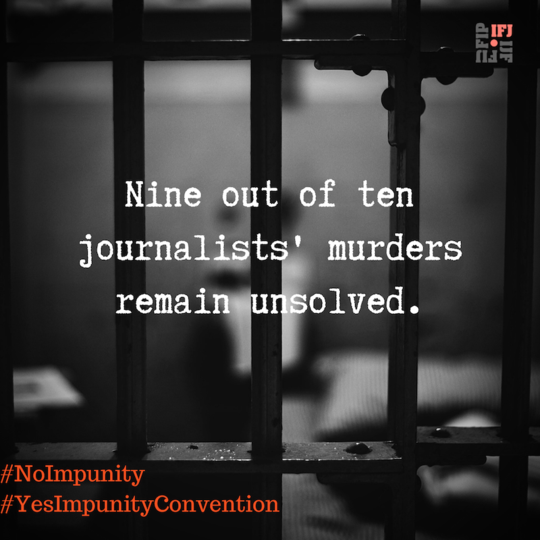
BELGRADE, 02.11.2018. – To mark the International Day to End Impunity for Crimes against Journalists, IJAS calls on the state to act against impunity of attacks on journalist and support IFJ proposal for a UN Convention to protect journalists and media professionals.
Dear Mrs. Brnabic,
The International Day to End Impunity for Crimes Against Journalists, established by a decision of the United Nations five years ago, was marked for the first time on the occasion of the first anniversary of the murder of French journalists Ghislaine Dupont and Claude Verlon in Mali.
Over the past 25 years, close to 2,500 journalists have been killed while doing their job, trying to inform the public about revolutions, coups and wars, as well as crime or corruption.
Between 1991 and the end of 2001, as many as 39 Serbian journalists and media professionals were murdered, kidnapped, went missing or lost their lives under unclarified circumstances. In most cases the individuals responsible for the murders of and attacks on journalists were not punished, and in some cases no investigation was ever launched.
There is no government in Serbia’s recent history that didn’t promise to quickly solve the murders. The current authorities have also formed a commission for solving the murders of journalists, as a symbolic illusion of changes that haven’t materialized in reality. Aleksandar Vucic, then-first deputy prime minister and now the head of state, even apologized, but not for having been part of the regime that had been involved in the murders, but for the fact that we had waited so many years for the murderers to be brought to justice. That same regime, spearheaded by Slobodan Milosevic, also involved Ivica Dacic and Maja Gojkovic, as well as former Serbian president Tomislav Nikolic, who said on the occasion of the commission’s forming that Serbia was “a just and legal state!”
Serbia is neither a just nor a legal state! Ever since the tragic death of Radislava Dada Vujasinovic, journalists have been asking that light be shed on her death; they have been appealing to the authorities to find and punish those who had in broad daylight, with cold-blooded and professional precision, assassinated journalist Slavko Curuvija; they have been calling for the finding and punishing of the cruel murderers of Milan Pantic. Our appeals live for a day, in a shrinking number of media, and they never seem to reach their intended recipients. The authorities do not hear them, they ignore them, the appeals bounce off them, and a year later they return like an echo to the place they started their quiet journey from, to be made again, to live for a day again, and on and on…!
It should be said that, fortunately, there haven’t been any murders of journalists for a long time. However, murder is not the only crime, it is the most severe form of crime: pressure, threats and physical assault on journalists mainly result in unease, fear and, ultimately, self-censorship, which most certainly undermines media freedom and the public’s right to be informed, and leaves the victims feeling helpless.
The attacks on journalists are not just attacks on their physical and psychological integrity, attacks on journalists are attacks on the freedom of expression and media freedom. The responsibility for that, of course, lies with those who attack the profession, but above all the state bodies, which are expected to fully respect national laws and their international obligations in order to ensure that both state and non-state perpetrators and instigators of violence against journalists are brought to justice.
That is why we do not appeal, but rather insist that the state bodies speak out regarding the increasingly frequent pressures on our colleagues, which have over the last three years been committed as many as 73 times by public officials, and thus encourage journalists to do their job and discourage those preventing them from doing it.
In 2017, the Independent Journalists’ Association of Serbia (IJAS) registered 31 cases of attacks on, threats to and intimidation of journalists. According to the IJAS’ latest data, of the total number the prosecution determined in six cases that there were no grounds for launching proceedings because there were no elements of a criminal offense that would be prosecuted ex officio. Twenty-three cases are being processed by the prosecution, while just one case has been solved by the handing of the measure of mandatory medical treatment at large and the placement of a restraining order. Court proceedings have been launched in one case, and misdemeanor proceedings in another.
In 2018, the IJAS registered 22 cases of attacks on, threats to and intimidation of journalists. Of that number, the prosecution determined in four cases that there were no grounds for launching proceedings due to a lack of elements of a criminal offense that would be prosecuted ex officio; 16 cases are still under way before the prosecution, whereas court proceedings have been launched in one case. One case was not reported to the police.
We urge the authorities to support a proposal by the International Federation of Journalists, for the U.N. to enact a Convention on the Protection of Journalists and Media Professionals. The Republic of Serbia is obligated to implement the UN Plan of Action on the Safety of Journalists and the Issue of Impunity, as well as the Council of Europe’s recommendations for the protection of journalism and safety of journalists and other media professionals.
We ask that our government take responsibility for the failure to punish attacks on journalists.
IJAS Executive Board
Belgrade, November 2, 2018